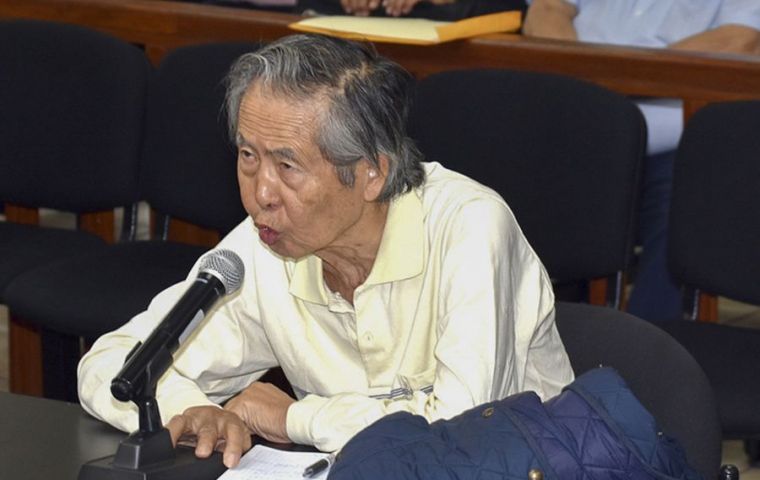MercoPress. South Atlantic News Agency
New charges pressed against Alberto Fujimori for atrocious crimes
 Fujimori was extradited from Chile in 2007 to be tried in Peru, but it did not include the forced sterilizations
Fujimori was extradited from Chile in 2007 to be tried in Peru, but it did not include the forced sterilizations Former Peruvian President Alberto Fujimori, who is already serving a prison sentence for crimes against humanity, has been indicted Saturday for yet another five killings plus the forcible sterilization of over 1,300 women under detention during his term in office (1990-2000).
Former health ministers under Fujimori Eduardo Yong, Marino Costa and Alejandro Aguinaga have also been charged for crimes against life, body and health, serious injuries followed by death in the context of a serious violation of human rights by the prosecution, where the case was about to be shelved in 2009, 2014, 2016 and 2018, according to the victims and their relatives.
In March this year, a prosecutor representing more than 1,300 forcibly sterilized women brought Fujimori and his aides to justice. On Sept. 14, Judge Rafael Martínez began to hear the case and made his decision after almost three months of interrupted hearings.
Prosecutor Pablo Espinoza had said earlier this year that the Fujimori government had focused on sterilizing the poorest. “The State had expressed its intention to sterilize all the poor, because there are no victims from other social sectors,” he said. He claimed that between 1996-2000 countless “health festivals” were organized in remote villages to attract women who were later sterilized without their informed consent.
The prosecutor also said the Fujimori government rewarded health officials who performed the highest number of sterilizations with free trips and other perks, but also threatened to fire them if they did not achieve their targets. According to the prosecution, there were 273,684 sterilizations of Quechua-speaking women among the poorest in the country between 1995 and 2000 and 1,599 complications.
Fujimori is serving a 25-year prison sentence for his involvement in the murders of 25 Peruvians, including an 8-year-old boy, at the hands of a clandestine group of soldiers plus other convictions, two of them for corruption.
Current Health Minister, Hernando Cevallos, denounced in 1997 that he and other doctors had been forced to perform sterilization procedures.
The victims underwent surgery to have their fallopian tubes tied up as part of the National Program for Reproductive Health and Family Planning which Fujimori promoted in his last four years in power. The program sought to reduce the birth rate to boost economic development. In these surgeries 18 women died, according to official data.
The trial may not start until Chile authorizes it, because after fleeing Peru in November 2000, Fujimori was extradited from Chile in 2007 to be tried in Peru, but the extradition did not include the forced sterilizations. It is believed that Chile's green light may take up to a year. Prosecutor Carmen Rosa Crisóstomo said the request will be presented in a timely manner, so that the Chilean judicial authorities can evaluate it.




Top Comments
Disclaimer & comment rulesCommenting for this story is now closed.
If you have a Facebook account, become a fan and comment on our Facebook Page!